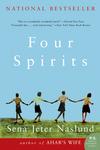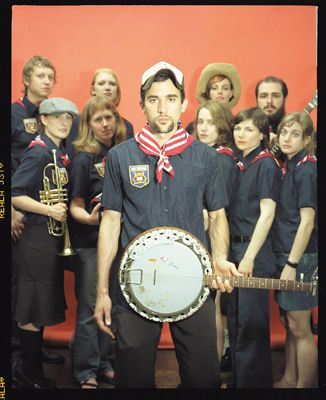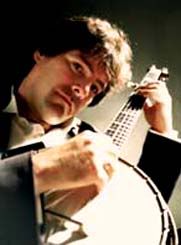Derek Webb's album
Mockingbird has a deliberate focus on the outworking of the Christian Gospel into areas of social concern, such as politics, poverty and war (see
Part 1). Derek has oft-referenced Jim Wallis' book
God's Politics as a major influence for the album; however, as I mentioned previously (see
Part 2), I don't think Wallis makes a firm case for Christian action in his book. Not only does his misuse of Scripture lay a shaky foundation, but his proposals for action too often seem to invite the Church's dependence on the State. On the other hand, Derek's songs and public statements point to a much more solid framework from which to mobilize a Christian response to the same issues.
Whereas Wallis appeals to a nebulous "wisdom of the prophets," Derek proclaims:
my first allegiance is not to a flag, a country, or a man
my first allegiance is not to democracy or blood
it's to a king & a kingdom
Derek firmly roots Christian ethics in the Gospel proclamation that Christ is Lord over all; furthermore, he argues that Christ has set us free from sin through the cross so that we might use that freedom to do the work of His kingdom. Jesus' commands, as well as the canonical teachings of the prophets, have authority because He is the resurrected King of Kings and Lord of Lords, not because of some fuzzy notion of sagely wisdom.
At the very end of Matthew's gospel, the resurrected Christ proclaims, "All authority in heaven and on earth has been given to me." The fact of His sovereign rule is the basis for commissioning the disciples to go into the world to make more disciples, baptizing them into the Triune name. However, the Great Commission is not merely about getting people to assent to true propositions about forgiveness through Christ (i.e., "putting sentences into their heads"), because Jesus also instructs his followers that their new disciples should be taught "to observe all that I have commanded you." That "all" is the full-orbed kingdom life proclaimed both by Jesus and by the written Word of God to which He attests. Finally, Jesus promises, "Behold, I am with you always, to the end of the age." Not only does Jesus possess the kingly authority to reign over His people, He also empowers them (by His Spirit) to obey all that He has commanded and to expand His kingdom.
So what exactly has Christ instructed? I don't think one can seriously study the Gospels and
not notice the attention that Jesus gives to those relegated to the lower rungs of society, whether on the basis of poverty, race, leprosy, etc. Sadly, I've encountered attempts to blunt the force of such passages by way of exegetical shenanigans. For example, the parable of the sheep and goats often becomes a battleground for discussing the issue of
sola fide. But too often, such discussions (as important as they are) can end up obscuring the passage's main thrust on how to treat "the least of these." Similarly, as I mentioned in the previous installment, some Christians employ Jesus' statement that "the poor you will always have with you" as an excuse to downplay the Church's response to poverty (i.e., "well, this problem is always going to be around no matter what we do, so what's the use in trying to fix it?"). However, the opposite appears true: this passage actually highlights the fact that the Church will always have the poor around to serve. As I've encountered a number of Reformed-ish folks employing a deficient interpretation of this passage, I think it is appropriate to consult Calvin:
Again, when he says that the poor will always be with us, we infer from it, that if many are in poverty, this does not arise from accident, but that, by a fixed purpose, God presents to us those on whom our charity may be exercised. (Harmony of the Gospels)
The exercise of Christian compassion to the poor (or others in need) is by God's design, because it displays His own love to the world. In recent concerts, Derek has stated that Christian charitable work is part of the Gospel announcement, because it proclaims a coming kingdom where God has made all things right. When Christians feed the poor or strive for peace, they declare a kingdom where there will be no hunger or strife. When Christians struggle to overcome racial and cultural prejudices, they announce a kingdom where all are truly one in Christ. Unfortunately, the eschatological weight of such statements is lost when we narrowly define the Gospel in terms of "what must we do to be saved?" I understand what those narrow definitions of the Gospel are trying to preserve, and Christians should be quite clear that no one will be saved because of their works of charity. But if the Gospel really is the good news about King Jesus and the coming of His kingdom, then we must declare what that kingdom looks like. In the end, there is no need to bifurcate "evangelism" and "works of mercy" because both are rolled into that Kingdom announcement. Christ's death and resurrection provide forgiveness of sins for the believer, but they also provide redemption from the effects of the Fall. Christian acts of charity and peacemaking are the Spirit-empowered outworkings of restoration.
Of course, none of this prescribes what form these restorative actions take. Obviously, the work of local churches and Christian organizations in directly meeting the needs (physical and spiritual) of the "least of these" cannot be encouraged enough. But what of larger-scale approaches, such as governmental policies advocated by Jim Wallis? I would humbly submit that Christians should be wary when advocating such actions, while admitting that the issue of how Christians should relate to the government is a complex one, with these posts merely grazing the surface. Christians can agree that all governments are empowered to protect citizens from harm and exploitation. Furthermore, it only seems reasonable that believers -- especially in a democratic republic -- should participate in the system at many levels to ensure that the government is doing its God-ordained job. However, Christians should not be so naive as to expect an ostensibly secular state (like the U.S.) to govern in accordance with Christian values. The more prudent course might be for churches to shift the focus away from grasping the political reins and onto proclaiming the Gospel and demonstrating the love of Christ to those in need. How much glory would be given to Christ if the government ended up cutting most public assistance programs because churches were already meeting those needs?
Granted, these suggestions are not nearly as well-defined as those proposed by Jim Wallis, but the complexity of these issues tends to rule out easy answers. Instead of demanding "a new law," Christians must exercise patience and wisdom in addressing social issues. At first glance, massive top-down solutions, such as government programs, may appear to provide faster results than the slow-and-steady expansion of isolated acts of compassion. But history shows that Christians have been able to transform whole societies by consistent proclamation of the Gospel in word and action, without the benefit of political might. Perhaps the best advice is for individual Christians and congregations to faithfully proclaim the kingdom and show grace in a myriad of seemingly-insignificant ways, all the while trusting God to weave these isolated acts together into something much greater.











